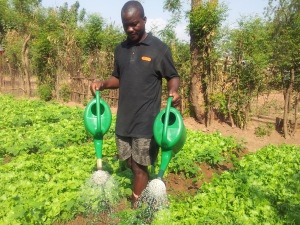Chairman of the Project Steering Committee of the recently launched Ghana Commodity Exchange (GCX), Joe Tackie, has called on financial institutions to get more engaged -- particularly in the settlements aspect of the GCX -- to enable them understand the platform better so as to provide much-needed financial assistance to smallholder farmers.
He told the B&FT in an interview that the common commodities trading platform has certain innovative features which have been designed to limit risks in the agric sector to attract agricultural investments, aside from the provision of a ready market and formalisation of commercial activities.
“One such innovative structure of the GCX is the Warehouse Receipt System, whereby farmers will be provided with receipts based on the food crops that they deposit.
“It is therefore prudent for banks to understand the system, so that they can see these receipts as collateral to provide funds to various actors along the agric value chain to push sector productivity and growth,” he said.
The comment comes on the back of limited investments to the agricultural landscape as banks and potential investors consider the dominant economic sector to be a risky venture.
The main factor limiting economic potential of the agric sector is lack of a common market that boosts the trust and confidence of farmers, as well as financial institutions to invest extensively in the sector toward economic growth.
But according to Mr. Tackie, the Exchange will significantly tackle the myriad challenges which make the agric sector a risky investment: “The GCX reduces risks of the agric sector, though not completely -- as farmers and sector actors will produce and deposit their crops to the designated warehouses and get the receipts to source funds from banks”.
This, he said, will help smallholder farmers to move from subsistence to commercial farming, as they will be able to grow more crops which the country has comparative advantage in to promote the national quest for an export-based economy.
The agric sector is a dominant one in the economy and offers informal employment to the vast majority of the country’s population; introduction of the GCX is thus a positive step toward achieving government’s vision of a revitalised agric sector that helps support efforts aimed at boosting and diversifying the country’s export trade.
Expected to be fully operational by the first half of next year, the project has been touted to transform the country’s agricultural landscape and also champion the cause of smallholder farmers who contribute significantly to national development.
This is because it will boost the trust and confidence of farmers and investors and rake in the requisite investments to unleash the agricultural sector’s economic potential as the backbone of Ghana’s economy.
The project engages broad participation of small-scale producers, commercial growers, domestic traders, agro-processing industries, commodity exporters, the national buffer stock administration, food aid agencies and other institutional buyers.
GCX is a private partnership deal between government and a private sector financing consortium comprised of credible domestic and global institutional investors: Ecobank Ghana Limited; GCB Bank Limited; London-based private equity fund, 8 Miles Fund; and the International Finance Corporation (IFC).
Business News of Wednesday, 8 July 2015
Source: B&FT













